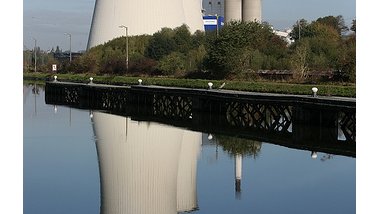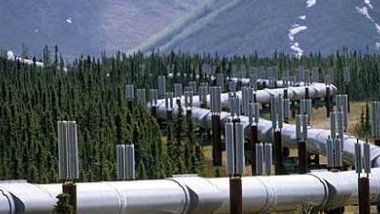The energy policy of the EU is closely linked with its climate objectives, since an efficient and competitive energy market is one of several preconditions to tackle climate change. In December 2008 an agreement was reached on Europe’s climate action and renewable energy package. The objective of this policy is to reduce greenhouse gas emissions to at least 20% below 1990 levels, improve energy efficiencyby 20% and increase the use of renewable energy to 20% of total energy production by 2020 [1].
To diminish Europe’s dependency on imported gas through gas pipelines from Russia and other countries, several alternatives exist. Next to the green energy technology that the EU wants to promote and develop, there is still the possibility of Liquid Natural Gas(LNG). The advantage of LNG is that it can be transported in liquid form, just as oil, so the purchaser doesn’t have to rely on the pipeline network anymore. In this way, gas could be transported from the most remote part of the world by sea or by road. However, LNG technology still needs to be refined and is quiet expensive to produce, transport and store.
Diversification of the gas transit routes to Europe is an equally crucial aspect in Europe’s energy policy. Most of the current routes are still remainders from the Soviet-era. Two major problems arise with this situation. Firstly, the fact that these pipelines come from just one country, Russia and mostly pass through two transit countries, Ukraine and Belarus. Secondly, Gazprom is a major stakeholder in all of these routes and not very eager to undermine its current quasi-monopolistic position. The so called ‘Gazprom-clause’ in the latest European gas directive is therefore a major concern for Russia, but equally crucial in diversifying the transit routes.
Different projects exist to construct new gas pipelines. However, some thorny geopolitical issues need to be resolved before the projects can actually be executed. These discussions threaten to drive a wedge between the EU member states, because of the stakes in play. Economical for some, political for others. It’s a striking example of Russia’s divide-and-rule game in European politics.
Diversification of the gas transit routes to Europe is an equally crucial aspect in Europe’s energy policy.
Nord Stream and South Stream are projected pipelines that have to connect Russia with Germany and Italy respectively, while bypassing the Eastern European countries. Including the most important transit countries, Belarus and Ukraine. Both pipeline projects are managed by a consortium of several energy companies [2], in which Gazprom takes the highest stake. Although contentious, it’s likely to improve Europe’s security of supply.
The European alternative is the Nabucco pipeline [3]. The aim is to transport gas from as far as Azerbaijan, through Georgia, Turkey, Bulgaria, Romania, Hungary and finally Austria, leaving Russia aside. A development that irritates Russia. Although Nabucco is still a project and far from realized, it seems to bear a significant weight on the geopolitical scale. As Georgia would be an important transit country, a political instable Georgia is appealing to Russia. Could it have been one of the underlying incentives for war in August 2008? As the pipeline is planned to run through Bulgaria and Romania, the EU had important reasons to allow these to join, although objectively they weren’t ready yet. The economic and political situation in both countries is dubious at the least.
Finally, to accomplish a viable and effective internal market, it is also important to establish a common foreign energy policy. A foreign policy solely focussed on energy won’t work however, but could set a spill-over effect in motion to develop a genuine European foreign policy. This is already happening in the realm of global warming. The EU needs to develop an ‘ecological diplomacy’ to spread its message and put pressure on other states to accomplish the proposed measures. Therefore the European Council launched the ‘Green Diplomacy Network’ in 2003. The climate conference in Copenhagen in December 2009 will be a litmus test for the EU to put its policy into practice.
It’s clear now that a common energy market can’t tackle the issue alone. The crisis demonstrated that a lack of alternatives, be it in transport routes, suppliers or energy resources, can exacerbate a supply crisis. That’s why the creation of a common energy market must be dealt with comprehensively including other policy realms. This could trigger a revival in the integration process of the EU. It may be equally clear that the EU doesn’t have to strive for complete import independence. On the contrary, this wouldn’t be feasible nor desirable. In an interdependent world both suppliers and purchasers have a common advantage to maintain good relations. Finally special attention must be reserved for technical disruptions and ‘end of supply’ scenario’s, which will be far more disruptive and critical for the durable survival of our society model. Thus, putting a common European Energy Policy (EEP) in the pipeline is a precondition to deal with all the challenges ahead.




Follow the comments: |
|
